HOME
Museum &
Collections
Soldiers of the Regiment
Sales
Donations
Events
Contact Us
REGIMENTAL HISTORY
17th Century
18th Century
19th Century
20th Century
First World War
Second World War
Actions & Movements
Battle Honours
FAMILY HISTORY
Resources
Further Reading
PHOTO GALLERY
ENQUIRIES
FURTHER READING
LINKS


© Images are copyright, Trustees of the King's Own Royal Regiment Museum.
You must seek permission prior to
publication of any of our images.
|
|
Second World War
On This Day

June 1940
1 June 1940
In the Battle of France, the 5th Battalion, King's Own defended
the Dunkirk perimeter at Les Moeres, (just on the border with
Belgium) until 2200 when ordered to withdraw to the Dunkirk
beaches about 10 miles away. The German forces did not follow
up.
Those men of the battalion who were killed in this action are
buried in Les Moeres Communal Cemetery
The 5th Battalion, King's Own reached the beach at Dunkirk in
small detachments and collected together as a unit. During the
withdrawal to Dunkirk the battalion had marched 85 miles in five
days.
Owing to a lack of boats not everyone was able to embark. Those
who remained spent the day under shellfire and three severe
Luftwaffe air attacks.
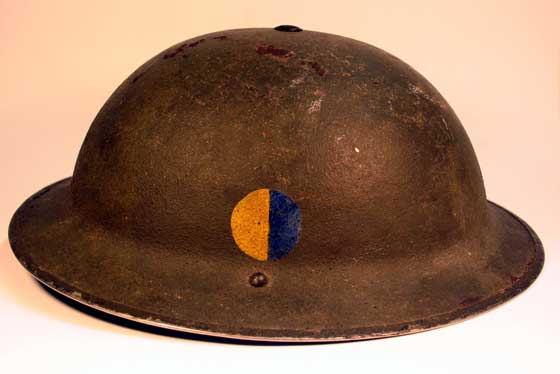
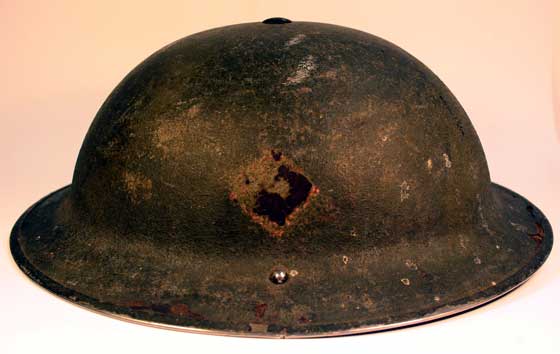
Captain Newhouse was one of the officers, and like the rest of
the battalion were ordered to remove identification marks from
their uniforms and helmets, so there was less intelligence
should they be captured by the Germans.
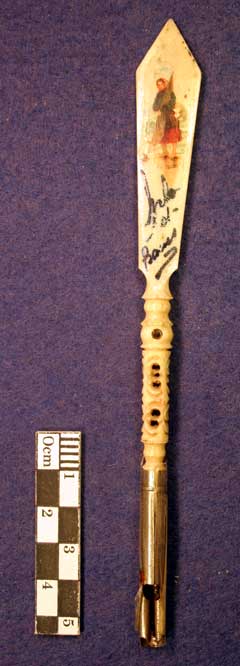
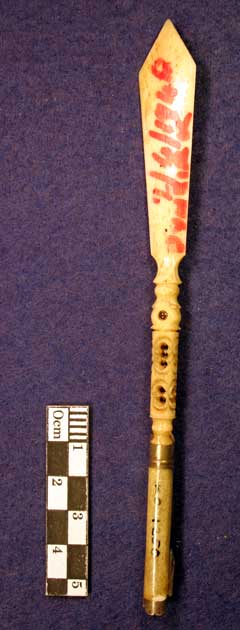
This souvenir pen holder with a view of the beach and the
wording 'Malo Les Bains' was picked up from the beach at Dunkirk
by Platoon Sergeant Major James Bell of the 5th Battalion,
King's Own Royal Regiment.
James Bell, number 3711297, a Lancaster man, served with the 5th
Battalion and was commissioned into the Pioneer Corps on 24th
August 1941. |
2 June 1940
Soldiers of the King's Own waited on the beaches at Dunkirk,
Nazi Germany's leader, Adolf Hitler made his first visit to
France in the War. He visited the First World War Canadian
Memorial at Vimy Ridge for a photo opportunity - in order to
deny the rumours that the memorial had been destroyed.
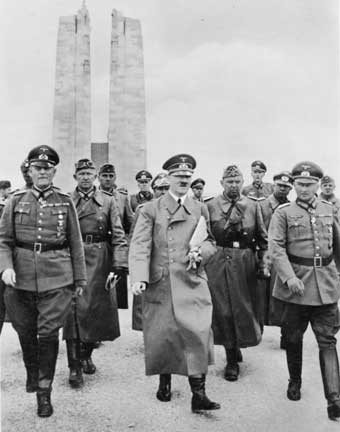 |
3 June 1940
Men of the 5th Battalion, King's Own, after marching 85 miles in
five days were on the beach at Dunkirk. At 2100 hrs the men who
had not yet been evacuated were gathered together on the beach
and marched to the mole. At 2230 the men embarked on board HMS
Locust. They were just a few of the 26 256 men of the British
Expeditionary Force and Allied forces evacuated on this day.
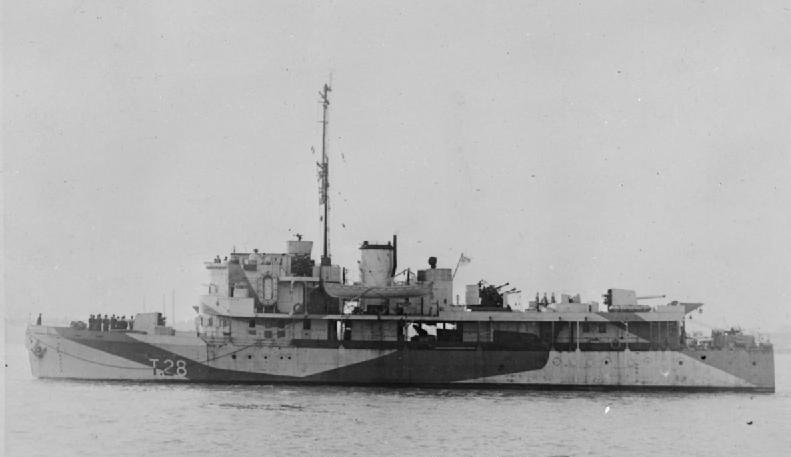 |
4 June 1940
This was the last day of Operation Dynamo, the evacuation of
British and Allied troops from Dunkirk. Between 27 May and 4
June 239 555 troops were evacuated from the harbour and a
further 98 671 from the beaches. This was a total of 338 226
evacuated back to Britain.
Prime Minister Winston Churchill addressed the House of Commons:
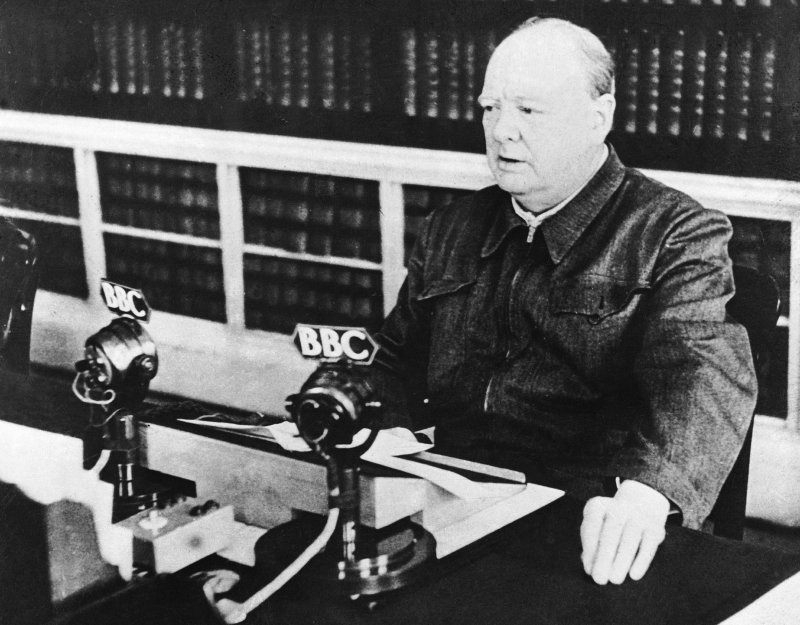
Even though large tracts of Europe and many old and famous
States have fallen or may fall into the grip of the Gestapo and
all the odious apparatus of Nazi rule, we shall not flag or
fail. We shall go on to the end. We shall fight in France, we
shall fight on the seas and oceans, we shall fight with growing
confidence and growing strength in the air, we shall defend our
island, whatever the cost may be. We shall fight on the beaches,
we shall fight on the landing grounds, we shall fight in the
fields and in the streets, we shall fight in the hills; we shall
never surrender, and if, which I do not for a moment believe,
this island or a large part of it were subjugated and starving,
then our Empire beyond the seas, armed and guarded by the
British Fleet, would carry on the struggle, until, in God's good
time, the New World, with all its power and might, steps forth
to the rescue and the liberation of the old.
Turning once again, and this time more generally, to the
question of invasion, I would observe that there has never been
a period in all these long centuries of which we boast when an
absolute guarantee against invasion, still less against serious
raids, could have been given to our people. In the days of
Napoleon, of which I was speaking just now, the same wind which
would have carried his transports across the Channel might have
driven away the blockading fleet. There was always the chance,
and it is that chance which has excited and befooled the
imaginations of many Continental tyrants. Many are the tales
that are told. We are assured that novel methods will be
adopted, and when we see the originality of malice, the
ingenuity of aggression, which our enemy displays, we may
certainly prepare ourselves for every kind of novel stratagem
and every kind of brutal and treacherous manœuvre. I think that
no idea is so outlandish that it should not be considered and
viewed with a searching, but at the same time, I hope, with a
steady eye. We must never forget the solid assurances of sea
power and those which belong to air power if it can be locally
exercised.
Sir, I have, myself, full confidence that if all do their duty,
if nothing is neglected, and if the best arrangements are made,
as they are being made, we shall prove ourselves once more able
to defend our island home, to ride out the storm of war, and to
outlive the menace of tyranny, if necessary for years, if
necessary alone. At any rate, that is what we are going to try
to do. That is the resolve of His Majesty's Government – every
man of them. That is the will of Parliament and the nation. The
British Empire and the French Republic, linked together in their
cause and in their need, will defend to the death their native
soil, aiding each other like good comrades to the utmost of
their strength.
Even though large tracts of Europe and many old and famous
States have fallen or may fall into the grip of the Gestapo and
all the odious apparatus of Nazi rule, we shall not flag or
fail. We shall go on to the end. We shall fight in France, we
shall fight on the seas and oceans, we shall fight with growing
confidence and growing strength in the air, we shall defend our
island, whatever the cost may be. We shall fight on the beaches,
we shall fight on the landing grounds, we shall fight in the
fields and in the streets, we shall fight in the hills; we shall
never surrender, and if, which I do not for a moment believe,
this island or a large part of it were subjugated and starving,
then our Empire beyond the seas, armed and guarded by the
British Fleet, would carry on the struggle, until, in God's good
time, the New World, with all its power and might, steps forth
to the rescue and the liberation of the old.
A question was asked in the House of Commons about the
establishment of a Corps of Parachutists and Gliders, following
the German attacks in Norway and in the Western Front. |
5 June 1940
During the 1940 Campaign in Belgium and France, 68111 British
soldiers were killed, wounded or taken prisoner of war.
Prisoners of War were only required to give their name, rank and
number to the Germans. This meant that the Germans were not to
be told their regiment or any other unit information. However,
the 1920 Army Numbering system which issued blocks of numbers to
regiments, provided the Germans a good idea of which Regiments
had been involved in the Campaign. An army wide numbering system
was later introduced, not tied to particular regiments.
|
6 June 1940
During the 1940 Campaign and evacuation from Dunkirk the British
Army lost a considerable amount of equipment – including 90
rifles; 2472 field guns; 8000 Bren guns; 400 anti-tank guns;
63879 vehicles; 20548 motorcycles and 689 tanks – with only 6
light and 7 cruiser tanks being evacuated.
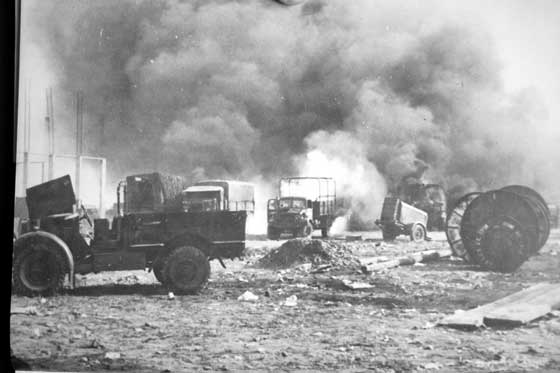 |
7 June 1940
During Operation Dynamo the Royal Navy lost 6 destroyers; 8
personnel carriers; 5 minesweepers; 1 sloop; 17 trawlers; 1
hospital ship and 188 lesser naval vessels…. Plus an un-known
number of civilian “little ships” which had been vital in
lifting the men off the beaches and taking them to larger
vessels.
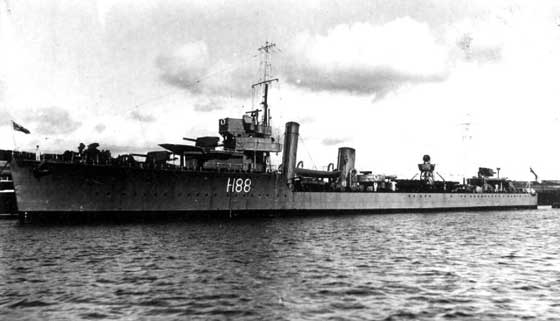 |
8 June 1940
One of the men of the 5th Battalion, King’s Own, who was
evacuated was Private William Rule. He had been wounded at
Dunkirk with a German ‘potato masher’ grenade. He recovered and
received skin grafts with pig skin, and left the army and worked
at Mitchell’s Brewery in Lancaster. He was killed in a road
traffic accident in 1964.
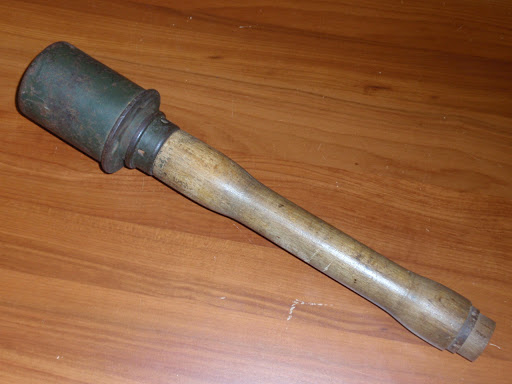 |
9 June 1940
The 2nd Battalion, King’s Own made themselves ready for a move
from Palestine to Helwan in Egypt, where their first duty was to
defend the aerodrome. |
10 June 1940
The 2nd Battalion, King's own, moved to Egypt.
2nd Lieutenant Geoffrey Rabbidge of the 56th Anti-Tank Regiment,
RA King’s Own, died at Dover as a result of injuries sustained
from bombs when the destroyer evacuating him was sunk.
On this day 80 years ago Fascist Italy declared war on France
and Britain as an ally of Nazi Germany. |
11 June 1940
The Italian air force attacked the strategically important
island and British colony of Malta, starting the siege of Malta.
A suggestion was made in the House of Commons that German
prisoners of war could be sent to the island of St. Helena, in
the South Atlantic Ocean, which has been used to house Boer
prisoners in the South African War 1899-1902.
In Karachi,
India, the 1st Battalion, King's Own supplied two 2nd
Lieutenants, a strong guard and police personnel to open an
internment camp for 70 Italians in Karachi. |
12 June 1940
After a last stand, the outflanked 51st Highland Division and
French 9th Army Corps surrendered to Rommel at Saint-Valery-en-Caux
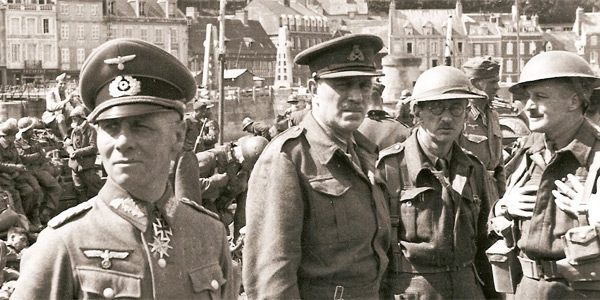
A suggestion was made in the House of Commons for an evacuation
of Dunkirk medal, awarded to all of those, including the
civilian sailors, who had taken part. |
13 June 1940
The ringing of church bells was banned, and they were only to be
rung by the military or police to warn of a German invasion –
generally meaning parachutists.
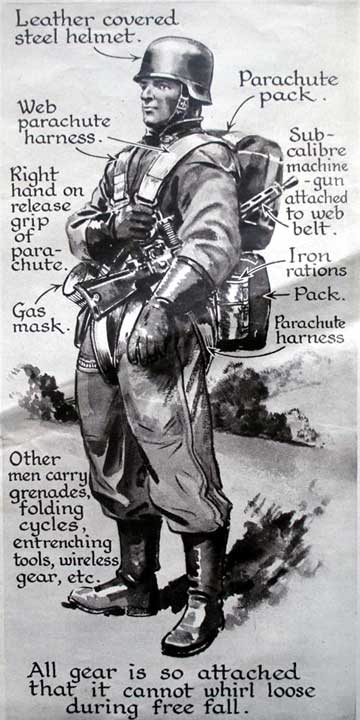 |
14 June 1940
Paris fell to the Nazi German forces.
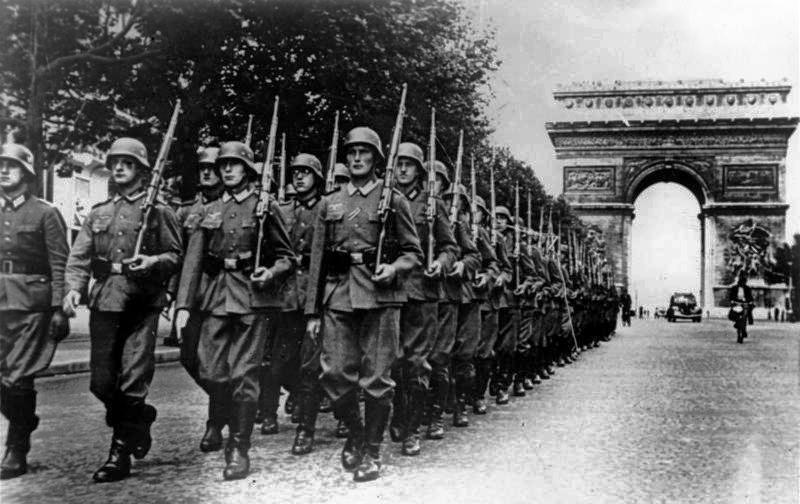 |
15 June 1940
Private Charles Whitehurst, of the 8th Battalion King’s Own, was
featured on the front cover of the Picture Post, safely back
from Dunkirk.
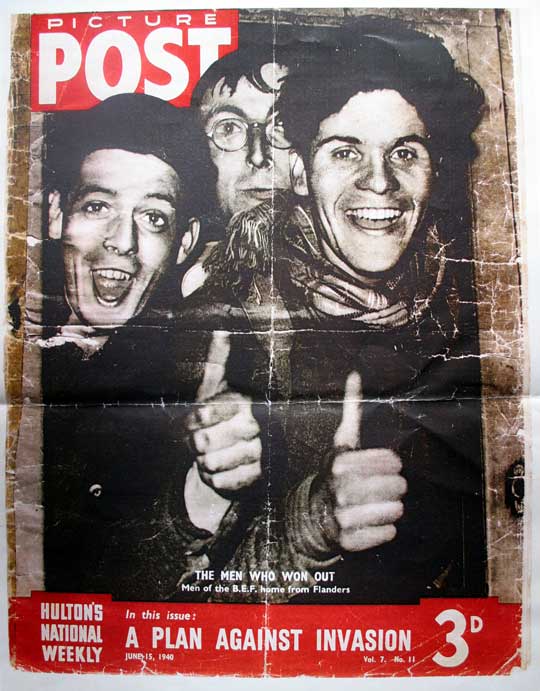 |
16 June 1940
Philippe Pétain became Prime Minister of France after Paul
Reynaud resigned. Only one hour after becoming the head of
government, Pétain asked his Foreign Minister Paul Baudouin to
pass a note to the Spanish ambassador asking Spain to request
"the conditions Chancellor Hitler would require to put a halt to
military operations and sign an armistice."
 |
17 June 1940
SS Lancastria was sunk 11 miles south west of St. Nazaire, with
between 3000 and 6500 fatalities, including civilians, embassy
staff as well as troops. Three direct hits from German aircraft
sunk the ship in 20 minutes. The Luftwaffe pilots began strafing
at survivors in the water which ignited the fuel oil. There were
2477 survivors and 1738 known to have died. So terrible was the
news the story was suppressed until 25 July when it appeared in
the New York Times, and the British press the next day.
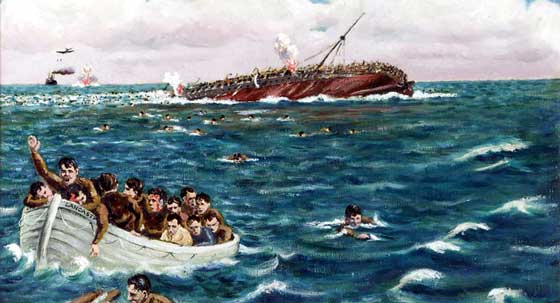 |
18 June 1940
Prime Minister Winston Churchill delivered the speech in the
House of Commons:
....However matters may go in France or with the French
Government or with another French Government, we in this island
and in the British Empire will never lose our sense of
comradeship with the French people. If we are now called upon to
endure what they have been suffering, we shall emulate their
courage, and if final victory rewards our toils they shall share
the gains, aye. And freedom shall be restored to all. We abate
nothing of our just demands—Czechs, Poles, Norwegians, Dutch,
Belgians, all who have joined their causes to our own shall be
restored.
What General Weygand has called the Battle of France is over...
the Battle of Britain is about to begin. Upon this battle
depends the survival of Christian civilisation. Upon it depends
our own British life, and the long continuity of our
institutions and our Empire. The whole fury and might of the
enemy must very soon be turned on us. Hitler knows that he will
have to break us in this island or lose the war. If we can stand
up to him, all Europe may be freed and the life of the world may
move forward into broad, sunlit uplands.
But if we fail, then the whole world, including the United
States, including all that we have known and cared for, will
sink into the abyss of a new dark age made more sinister, and
perhaps more protracted, by the lights of perverted science. Let
us therefore brace ourselves to our duties, and so bear
ourselves, that if the British Empire and its Commonwealth last
for a thousand years, men will still say, "This was their finest
hour." |
19 June 1940
The 5th Battalion, King’s Own was ordered to protect vulnerable
points in Yorkshire, including Ferrybridge Power Station; RAF
station at Leconfield; Petrol depot at Murton near York and the
Blackburn Aircraft Factory at Brough, near Hull.
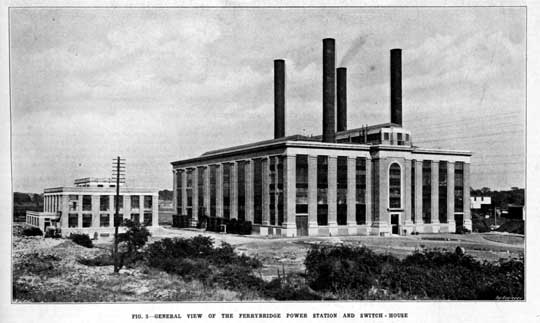 |
20 June 1940
There was a real worry of German invasion of the British Isles.
Units of the King's Own were deployed to coastal defence as well
as to protect key sites. The Picture Post of June 1940
illustrated how a quick road block could be established in the
event of an invasion.
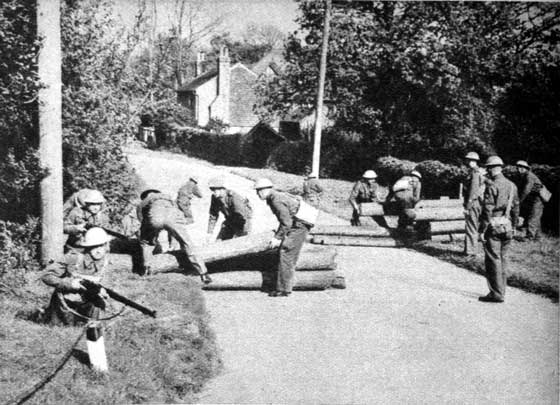 |
21 June 1940
Peace negotiations started between Germany and France in the
same railway carriage in which the Armistice of 11 November 1918
was signed.
Italy also launched an offensive into the French Alps, amid a
freak snowstorm, and made little progress.
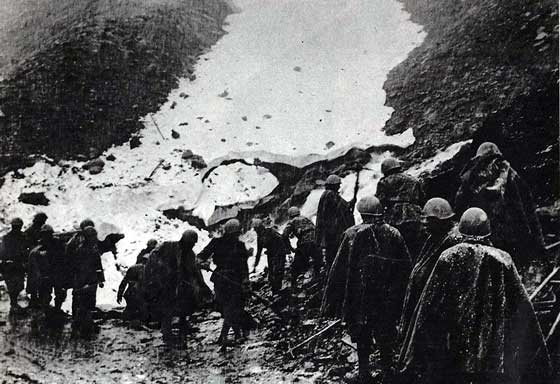
A draft of 244 men from the King’s Own Infantry Training Centre
in Lancaster joined the 5th Battalion, King’s Own in
Northallerton. |
22 June 1940
An Armistice was signed between France and Germany in the same
railway carriage in which the Armistice of 11 Nov 1918 was
signed. . A German occupation zone was established in North and
West of France.
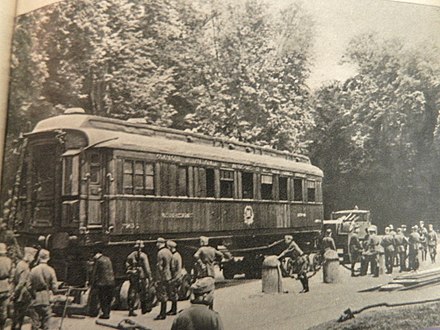 |
23 June 1940
Adolf Hitler, the German leader, visited Paris and took in the
sites of the Eiffel Tower, Arc de Triomphe, and Napoleon’s tomb.
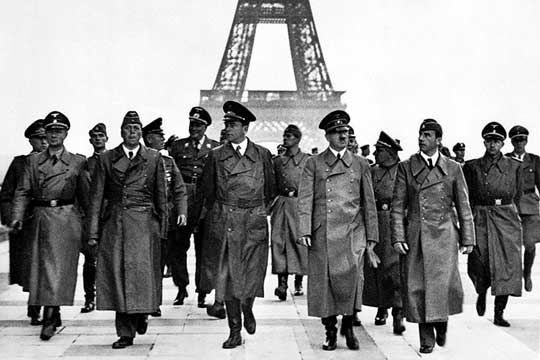
Meanwhile in Northallerton the 5th Battalion, King’s Own, held a
church parade in All Saint’s Church in the Yorkshire town.
The BBC introduced two 30 minute broadcasts for the benefit of
factory workers, to assist production and prevent fatigue
amongst workers. Ralph Etherton, MP for Stretford, suggested a
couple of days later in the House of Commons that the music was
rather dull and the broadcasts should be increased to two of 60
minutes each.
Music While You Work.
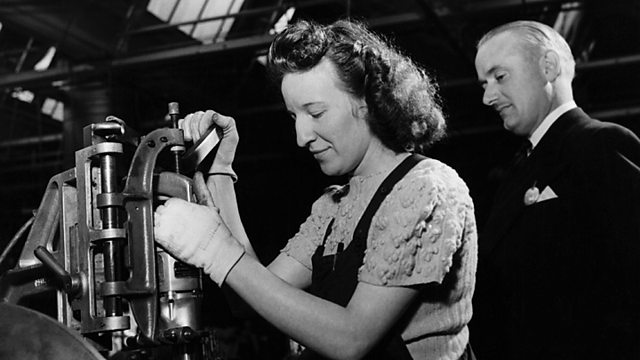 |
24 June 1940
The Lancaster Local Defence Volunteers organised into four
companies:
A Company covered the A6 North and Blackcastle Lane.
B Company covered Williamson’s Park and Caton Road
C Company covered Langthwaite Reservoir and the A6 South
D Company covered Stodday, Aldcliffle and Waterloo Point. |
25 June 1940
Operation Aerial came to an end. This was the evacuation of
Allied Forces and civilians from Western France. More than 191
870 troops were evacuated from the West of France.
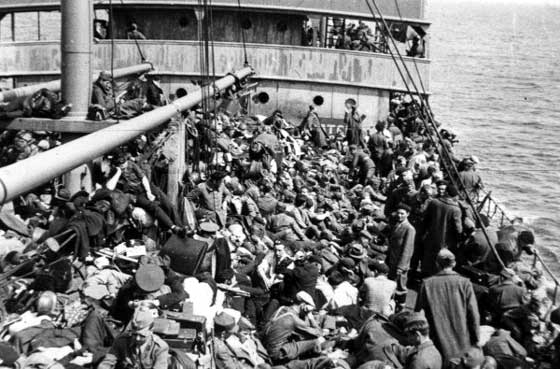 |
26 June 1940
The 9th Pioneer Battalion of the King’s Own was located n
Barmouth, North Wales. The battalion was being refitted with
clothes and equipment, but arms were hard to obtain. A draft of
260 men from the North Staffordshire Regiment and 103 from the
King’s Own had just arrived, increasing the strength of the
battalion to 1100 men. |
27 June 1940
Nazi German forces completed the occupation of France by
reaching the Spanish Border.
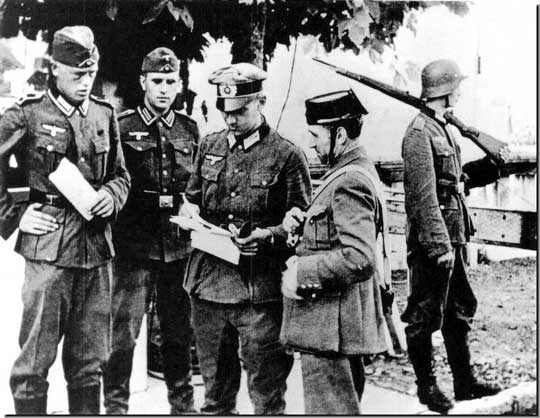 |
28 June 1940
The Local Defence Volunteers established a Watching Platoon
which was based in Lancaster’s Williamson’s Park, where they
would report any German aircraft and report their presence to
the authorities in Barrow in Furness with it’s important
shipyards and other industries.
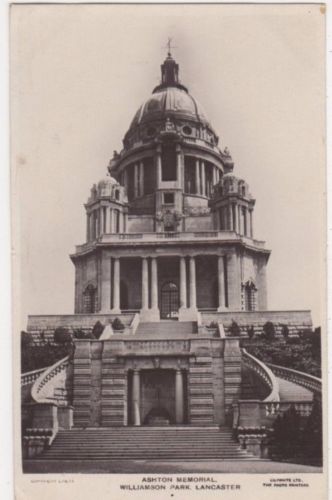 |
29 June 1940
The Local Defence Volunteers in Lancaster, were being instructed
by King’s Own Staff at the Infantry Training Centre at Bowerham
Barracks. Instruction included weapon training, care and
cleaning of weapons, musketry and laying aim.
In Karachi,
India, the 1st Battalion, King's Own, held a jumble sale in the
gymnasium and the proceeds were forwarded to the King's Own
Comforts Fund. |
30 June 1940
Private George Roberts of the 5th Battalion, King’s Own escaped
from imprisonment at Lille. He had been taken prisoner on 27th
May at Tournai, escaped at Ath, three days later, and picked up
at Calais whilst searching for a boat. From Lille he made it to
Paris and on 15th July was interned in unoccupied France. He
crossed into Spain on 27th April 1941 and was imprisoned for 5
weeks before moving to Gibraltar, which he left on 4th July
1941, and arrived in Glasgow on 13th July 1941.
German forces occupied the Channel Islands.
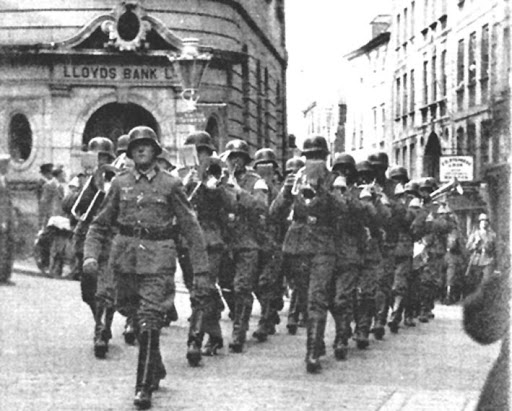
The 5th Battalion, King’s Own, received 21 Bren guns, 11
anti-tank weapons and Thompson Sub-machine gun from Ordnance. |
July 1940
© Images are copyright, Trustees of the King's Own Royal Regiment Museum.
You must seek permission prior to
publication of any of our images.
Only a proportion of our collections
are on display at anyone time. Certain items are on loan for display
in other institutions. An appointment is required to consult any of
our collections which are held in store. |




























